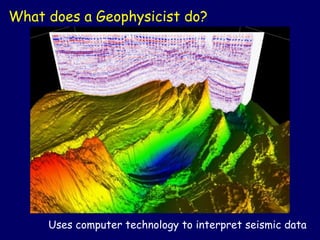All Categories
Featured
Table of Contents
Why Study Geology? in Wembley Downs Western Australia 2020
Are you seeking the best type of b-school? Link with MBA programs looking for prospects like you. Explore schools of all sizes, ranked colleges, city and big-campus schools and more. Apply. Pay. Preparation. Study. Succeed. We have actually got you covered. Link with master's programs around the country to get an edge over the competitors.

A geophysicist studies different elements of the earth. According to the U.S. Geological Survey, they study gravity, magnetic, electrical, and seismic activity incidents. Geophysicists also document, examine, and take measurements of geographical functions and abnormalities. View a video to learn what a geophysicist: Geophysicists should earn a minimum of a bachelor's degree; however, this is for an entry-level position.
If you desire study you must pursue a Ph. D. Undergrad coursework generally consists of geology, mathematics, ecological science, or physics. Advanced degrees require more particular research studies in the specialty of choice. Areas can consist of oceanography, atmospheric physics, meteorology, planetary, petroleum, ecological, and mining. Task prospects are higher if you have a strong background in computer technology or technology.
Job Profiles : Geophysicist Physics in Heathridge WA 2023
Access to these chances may be limited depending upon where you live; nevertheless, internships or summertime programs with geophysical business, university geophysics department, or the U.S. Geological Survey can be options. You can find a list of a list of chances on the United States Geological Survey (USGS) websites' Pathway Programs tab (opens in another link).
Geophysicists also work with computers while investigating, so computer courses can likewise be useful, as pointed out previously in this post. Numerous geophysicists specialize in a location of geophysics.
A geophysicist's tasks can include measuring, tracking, and documenting information from different physical residential or commercial properties on earth. Geophysicists typically have to take a trip worldwide to analyze geological events that have taken place or might have been predicted.
Job Profiles : Geophysicist Physics in Kiara Western Australia 2023
For example, Jay Wellik, a geophysicist, research studies volcanos. His area of knowledge in geophysics is researching why volcanos erupt and what signs there may be that an eruption might take place. He tracks seismic activity and then follows what occurs in the past, throughout, and after a volcano emerges. Geophysicists typically work full-time hours; however, they frequently work irregular hours, as discussed formerly.

You can discover extra information about Geophysicists in addition to additional academic materials on the U.S. Geological Survey website (links open in a new window). Laura Stern, of the U.S. Geological Study at the Gas Hydrates Lab in Menlo Park, California: We make a variety of different hydrates in the laboratory.
We also make carbon dioxide hydrate, ethane hydrate, lp, a number of various structures. It's about 100 degrees chillier than the temperature at which these hydrate samples would dissociate, when they would decay to ice plus gas on the tabletop.
Geophysicist - Job Role - Job Information in Shoalwater Oz 2022
They look like snow, it looks like compressed snow however truthfully, it does contain gas inside. It's going back to ice plus gas and then as the ice would melt as it continues to warm, it will end up being water plus gas.
My name is Steve Kirby, I'm a Geophysicist here at the U.S. Geological Survey in Menlo Park. I deal with Laura Stern who is likewise a Geophysicist in this lab that adheres towards the examination of planetary ices and gas hydrates. Gas hydrates in nature occur in really remote locations and they are very complicated with the interactions and conditions that they form under and samples that are brought up are under some sort of alternation or decomposition.
This is an unusual laboratory and there are just a handful of them worldwide and we are very lucky to be here at the Geological Survey and to have the opportunity of dealing with them. Bureau of Labor Stats, U.S. Department of Labor, Occupational Outlook Handbook, Geoscientists. National Center for O * Web Advancement.
Geophysical Survey And Investigations in Willagee Oz 2020
00. O * Web On, Line. This video was produced by the federal government for the U.S. Geological Survey. The USGS Gas Hydrates Laboratory is funded by the Department of Energy and the USGS Gas Hydrates Project.
Latest Posts
Geophysical Survey Definition in Bayswater Oz 2023
Geophysical Surveys: Definition & Methods in Ardross Australia 2020
What Is Geophysics And What Do Geophysicists Do? in Maddington WA 2023